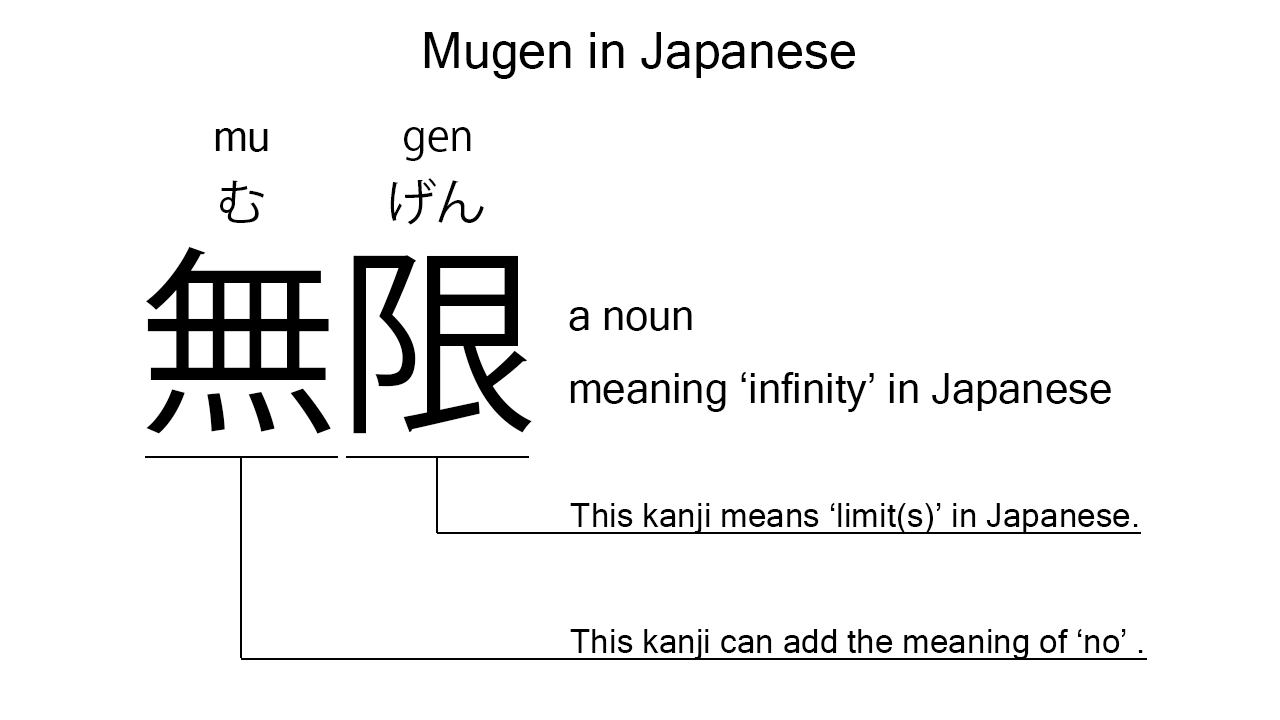What does “mugen” mean in Japanese?
Native speakers use mugen to mean ‘infinity’ in Japanese. Perhaps, some Japanese learners know this word as it is sometimes used in Japanese movies, songs, novels, manga, anime, and the like. In this blog post, however, I will explain this word in detail based on its kanji expression. And also, I will explain how to use it through example sentences. My explanations would help Japanese learners understand mugen more clearly. Then, let’s get started!
Contents
Definition and meaning of “mugen”
Let me start with the definition and meaning of mugen.
- mugen – 無限 (むげん) : a noun meaning ‘infinity’ in Japanese.
The definition and meaning are very simple and clear. To understand this noun more clearly, however, let me explain its kanji characters in detail, one by one.
Mugen in kanji
The kanji expression of mugen consists of the following two kanji characters:
- 無 : a kanji character often used as a prefix to add the meaning of ‘no’, ‘not’, or ‘non’.
- 限 : a kanji character used to mean a ‘limit’ in Japanese.
From these two kanji characters, we can understand that mugen literally means ‘no limit’ in Japanese. This literal interpretation is not completely in line with the actual meaning, but still very understandable, I think. Infinity is often something with no limits.

When we meet new kanji expressions, we should check their kanji characters in detail to understand their meanings clearly and deeply. In many cases, kanji characters tell us a lot about the meanings of the expressions they form. Actually, here, we could get the better understanding of mugen through the detailed kanji check above.
So far, I’ve explained the definition and meaning of mugen together with its kanji characters. Then, let me explain how to use it through the example sentences below.
How to say “infinity” in Japanese
boku wa tokidoki uchuu no mugen nitsuite kangaeru – 僕は時々宇宙の無限について考える (ぼくはときどきうちゅうのむげんについてかんがえる)
Sometimes I think about the infinity of the universe.
Below are the new words used in the example sentence.
- boku – 僕 (ぼく) : a pronoun meaning ‘I’ in Japanese. This is used mainly by boys and young males.
- wa – は : a binding particle working as a case marker or topic marker. In the example, this works after boku to make the subject in the sentence.
- tokidoki – 時々 (ときどき) : an adverb of frequency meaning ‘sometimes’ in Japanese.
- uchuu – 宇宙 (うちゅう) : a noun meaning ‘the universe’ in Japanese.
- no – の : a case particle used to join two nouns. Normally, the first one can work as a modifier to describe the second. In the example, this is used to join uchuu and mugen. The formed phrase literally means ‘the infinity of the universe’ in Japanese. Word orders in Japanese and English are different, but the role of this case particle is very similar to that of the English preposition, of.
- nitsuite – について : a compound word meaning ‘about’ in Japanese.
- kangaeru – 考える (かんがえる) : a verb meaning ‘to think’ in Japanese.
This is a typical usage of mugen. In this example, it works as a part of the noun phrase, uchuu no mugen, which means ‘the infinity of the universe’ in Japanese. When we want to mean ‘infinity’ in Japanese, anyway, this noun is a very good option.
Another example of “mugen”
kodomo wa mugen no kanousei wo mot te iru – 子供は無限の可能性を持っている (こどもはむげんのかのうせいをもっている)
Children have infinite possibilities.
Below are the new words used in the example sentence.
- kodomo – 子供 (こども) : a noun meaning ‘children’ in Japanese.
- kanousei – 可能性 (かのうせい) : a noun meaning a ‘possibility’ in Japanese. This can also work as plural. Learn more about Japanese plural.
- wo – を : a case particle used to make the object word in a sentence. In the example, this is used after mugen no kanousei to make the object in the sentence.
- mot – 持っ (もっ) : one conjugation of the verb, motsu, which means ‘to have’ in Japanese. In the example, it has been conjugated for the better connection with its following word.
- te – て : a conjunctive particle used after a verb, adjective, or auxiliary verb to make its te form. In the example, this is used after mot to make its te form, mot te. Verbs need to be changed to their te forms to be connected with iru.
- iru – いる : an auxiliary verb used to express the continuity of the action described by its preceding verb. In the example, this is used after the te-formed verb, mot te, to express the continuity of its action, ‘to have’.
This is another example of mugen. In this example, it works together with the case particle, no, to modify its following noun. So, it works like an adjective to add the meaning of ‘infinite’. In Japanese, the border between nouns and na-adjectives is very ambiguous. Depending on the word used together, therefore, mugen can work like an adjective to add the meaning of ‘infinite’. It’s worth knowing.
Summary
In this blog post, I’ve explained the definition and meaning of mugen in detail based on its kanji expression. And also, I’ve explained how to use it through the example sentences. Let me summarize them as follows.
- mugen – 無限 (むげん) : a noun meaning ‘infinity’ in Japanese. These two kanji characters literally mean ‘no limit’ in Japanese. This literal interpretation is not completely in line with the actual meaning, but still very understandable. Infinity is often something with no limits. Grammatically, this is a noun. Depending on the word used together, however, this can also work like an adjective to add the meaning of ‘infinite’.
Hope my explanations are understandable and helpful for Japanese learners.
Leave a Reply